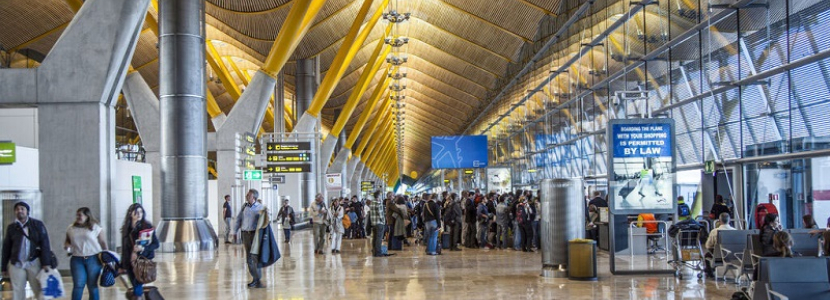
Businesses will be exempted from rent during the cessation of their activity
The airport manager Aena will reorganize the airport facilities to "adapt them to the specific needs" in view of the reduction in operations due to the travel restrictions imposed to curb the coronavirus, closing terminals in the main Spanish airports, such as Adolfo Suárez Madrid-Barajas or El Prat, according to the Minister of Transport, Mobility and Urban Agenda, José Luis Ábalos, in a telematic press conference.
Specifically, to "adapt to the measures taken by the Government" to deal with the health emergency and the "drop in activity", the airport manager "will adjust the capacity at airports to the specific needs of the operation", as stated in a press release sent to the National Securities Market Commission (CNMV).
The manager will reorganize the facilities in a "gradual" process over the next few days and aims to achieve "more efficient management and ensure that operations can recover in the same way as demand" when "the upturn" occurs.
Ábalos said that this reorganization will group the operations of terminals T2 and T3 of the Adolfo Suárez Madrid-Barajas airport into T1, to later group all operations into T4.
At the Josep Tarradellas Barcelona-El Prat airport, according to the new organisation, the areas in A to D of terminal 1 will remain operational, eliminating operations in T2.
In the Balearic and Canary Islands, following Ministerial Orders restricting the number of operations, gradual adaptations will also be made. Specifically, Palma de Mallorca Airport will keep modules B (inter-island) and D operational. Domestic flights will also operate in module B. Likewise, in Ibiza and Menorca, the reduced winter configuration will be maintained.
In the Canary Islands, adjustments will be made to the operation and suspension of activity in some facilities once the rescue operations for tourists who were on the islands have been completed. In Gran Canaria, two thirds of the terminal building will be closed, in Tenerife Sur it will be operated on a single floor, and in Lanzarote only the T2 will be used. Similarly, in the rest of the airports, "only the essential infrastructures" will remain in service.
In the cases of the Ceuta Heliport and the Melilla airport, both infrastructures will be kept available for exemptions from the closure of passenger traffic.
At the other airports in the network, the opening and closing times and the use of the facilities will be adapted to the new operations of the airlines.
Rent exemption
As a consequence of these closures, as explained by Ábalos, there will be "commercial activities that cannot be operational", and therefore Aena will exempt from rentals those businesses that are affected by the air inactivity.
The airports will keep open the establishments that are essential to serve workers, suppliers and passengers on the premises, some catering services in the main airports, as well as employee canteens.
In addition, press and convenience stores, which sell food and beverage items, will be open. He has also assured that "special attention" will be paid to the supply of vending machines.
Ábalos has highlighted that during the weekend have been reduced by 82% air operations compared to last year, a percentage that has been repeated this Monday, although "throughout the day there will be cancellations," so "it will be lower.
Credits https://agenttravel.es/noticia-037331_Aena-cerrara-terminales-en-Barajas-y-El-Prat-para-adaptarse-a-la-reduccion-de-trafico-.html


